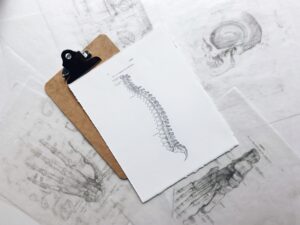Generally, neck issues are common complaints. For example, your neck muscles might strain out due to a poor posture, including hunching over the workbench or leaning over a computer. Additionally, Osteoarthritis might also lead to neck pain.
Also, it is essential to know that neck pain might also be a sign of more severe issues. Be sure to visit your doctor if you are experiencing some pain in your neck accompanied by loss of strength and hand or arm numbness. Additionally, you may also experience some sharp pain in your arm or shoulder.
Symptoms of a Neck Pain
Some of the signs of neck pain include:
- Muscle spasms and tightness
- Shooting pain, as a result of holding your pain for a long time, like when working on your computer or while driving.
- Headache
- Difficult when moving your head
Diagnosis
Once you visit your doctor, they will examine you after going through your medical history. The exam involves checking for numbness, muscle weakness, and tenderness. In addition, they will check to find out how far your head can move side to side and backward and forward.
Imaging Tests
Typically, your doctor might recommend some imaging tests to determine the primary cause of the neck pain. Some of the imaging tests include:
- X-rays can reveal your neck areas where your spinal cord or nerves could be pinched by degenerative changes or even by bone spurs
- MRI, this imaging test uses some strong magnetic field and radio waves to produce a detailed image of your soft tissues and bones, including the nerves and your spinal cord
- CT scan involves taking X-ray images from different angles to create a clear view of your neck internal structures
Additionally, it is important to note that both MRI and X-ray can reveal evidence of structural issues with your neck even without experiencing any symptoms.
Other Tests
- EMG (Electromyography)
Where your specialist suspects that your neck pain results from a pinched nerve, an EMG test might be the best option. First, your doctor will insert a fine needle into your muscle through your skin. Then, using the inserted needle, your specialist will measure your nerve conduction speed to determine the functionality of specific nerves.
- Blood Tests
Typically, your neck pain might be a result of some infections and inflammatory conditions. With this test, your doctor will determine whether the pain is a result of such conditions.
Treatment
Generally, most neck pains are usually treatable using self-care. However, if your neck pain persists, be sure to visit your doctor for further treatment.
- Medications
Once you visit your doctor, they might recommend some stronger medicine to help you relieve the neck pain and muscle relaxants.
- Alternative Medicine
Be sure to discuss with your doctor about taking alternative medicines for treating your neck pain. The alternative treatments have their advantages and drawbacks, and your specialist will help you understand them both.
Some of the alternative treatments include:
• Acupuncture, which involves inserting a fine needle into various body areas. Generally, acupuncture is considered a safe treatment when done by a professional using sterilized needles.
• Neck massage, performed by a trained practitioner. It involves manipulating your neck muscles using your hands. Additionally, when combined with doctor’s prescribed treatments, it may yield better results.
• A chiropractic adjustment is usually performed on the spine. Chiropractic treatments typically provide pain relief with minimal risks.
Therapy
1. Temporary Immobilization
Your doctor may recommend a soft collar to help you support your neck. A soft collar usually takes pressure from your neck structure hence relieving the pain. Nevertheless, if used for an extended time, it may cause more harm than treatment.
2. (TENS) Transcutaneous Nerve Stimulation
This treatment option involves placing an electrode near the painful parts of your neck. The electrode usually delivers electrical impulses to help you relieve the pain. The treatment applies weights and air bladders to stretch your neck. Be sure to look for a licensed physical therapist to help you relieve neck pain using this therapy.
3. Physical Therapy
Another effective way of dealing with neck pain is through a physical therapist. A qualified physical therapist will coach you correct posture, neck-strengthening, and alignment exercises. Additionally, they may use electrical stimulation, ice, heat, among other techniques, to help you relieve pain and also avoid a recurrence.
Other Neck Pain Treatment Procedures
Your doctor might recommend steroid injections. Usually injected near your small facet joints, nerve roots to help you relieve neck pain. Although rarely required for treating neck pain, surgery may be the best option to help you relieve spinal cord and nerve root compression.
Conclusion
Generally, there are various available to help you treat neck pain. Are you looking for the best ways to relieve neck pain? If so, be sure to contact us today at 205-637-1363 and book an appointment.








